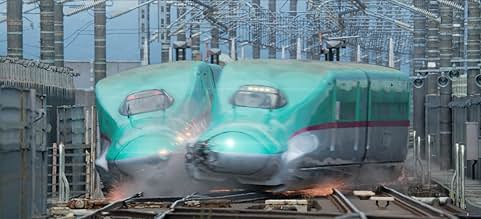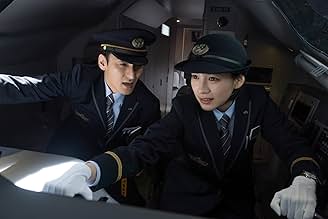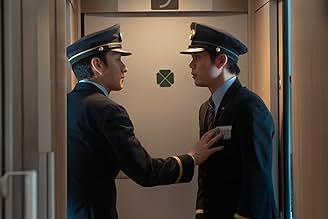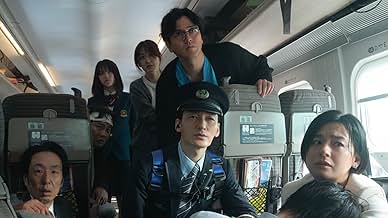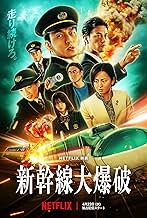Un gruppo che attacca delle bombe a un treno ad alta velocità giapponese nel tentativo di estorcere denaro al governo.Un gruppo che attacca delle bombe a un treno ad alta velocità giapponese nel tentativo di estorcere denaro al governo.Un gruppo che attacca delle bombe a un treno ad alta velocità giapponese nel tentativo di estorcere denaro al governo.
- Regia
- Sceneggiatura
- Star
Recensioni in evidenza
I just finished watching Netflix's new "Bullet Train Explosion" (2025) and couldn't help but notice all the comments claiming it's "just a Speed ripoff." Oh, sweet summer children of cinema...
For those whose film history knowledge apparently begins with Keanu Reeves, allow me to enlighten you: "Shinkansen Daibakuha" isn't copying Speed (1994). It's a REBOOT of the ORIGINAL "Shinkansen Daibakuha" from 1975 - a Japanese disaster thriller released NINETEEN YEARS BEFORE "Speed" even existed.
That's right. The "can't slow down or it explodes" concept that everyone associates with "Speed" was actually pioneered by this Japanese film starring Ken Takakura, Sonny Chiba, and other legendary Japanese actors nearly two decades earlier. The original featured Japan's bullet train that would explode if it dropped below 80km/h, with criminals demanding ransom money.
So who copied whom? If anything, "Speed" borrowed from Japan, not the other way around. Shinji Higuchi's new Netflix adaptation is simply bringing a Japanese classic back to life for a new generation.
The irony of Western viewers accusing a Japanese reboot of copying an American film that may have been "inspired" by the original Japanese concept is absolutely delicious. It's the perfect embodiment of that meme where someone makes a joke, someone else says it louder, and gets all the credit.
For those whose film history knowledge apparently begins with Keanu Reeves, allow me to enlighten you: "Shinkansen Daibakuha" isn't copying Speed (1994). It's a REBOOT of the ORIGINAL "Shinkansen Daibakuha" from 1975 - a Japanese disaster thriller released NINETEEN YEARS BEFORE "Speed" even existed.
That's right. The "can't slow down or it explodes" concept that everyone associates with "Speed" was actually pioneered by this Japanese film starring Ken Takakura, Sonny Chiba, and other legendary Japanese actors nearly two decades earlier. The original featured Japan's bullet train that would explode if it dropped below 80km/h, with criminals demanding ransom money.
So who copied whom? If anything, "Speed" borrowed from Japan, not the other way around. Shinji Higuchi's new Netflix adaptation is simply bringing a Japanese classic back to life for a new generation.
The irony of Western viewers accusing a Japanese reboot of copying an American film that may have been "inspired" by the original Japanese concept is absolutely delicious. It's the perfect embodiment of that meme where someone makes a joke, someone else says it louder, and gets all the credit.
With all due respect to my fellow critics-whose insights I genuinely admire-I must gently (but firmly) tap the brakes on this recurring assertion that Bullet Train Explosion is little more than a Japanese Speed. Yes, both films hinge on the same pulse-quickening premise: a vehicle that must maintain velocity or detonate spectacularly. But before we declare Speed the originator of this trope, let's give history its proper due-and a little reverence.
Because long before Keanu Reeves fired off "Pop quiz, BLEEP," and Sandra Bullock white-knuckled her way into action-movie legend, there was The Bullet Train (Shinkansen Daibakuha, 1975). A Japanese thriller that introduced the world to a high-speed train wired to explode if it dipped below a certain speed. Sound familiar? It should. This was the first film to plant a bomb squarely under the concept of velocity. And it was brilliant.
But the lineage doesn't stop there. Even Speed's screenwriter, Graham Yost, credited his inspiration not as some divine spark, but as a cinematic handoff from Runaway Train (1985)-another nail-biter about an unstoppable locomotive hurtling toward oblivion. Here's where it gets even juicier: Runaway Train was originally the brainchild of none other than Akira Kurosawa. Yes, that Kurosawa. The auteur behind Seven Samurai and Rashomon. He wrote the screenplay in the 1960s, envisioning a deeply human, existential thriller set aboard a runaway engine. Though he never got to direct it, his vision survived and roared to life years later under Andrei Konchalovsky.
So let's be clear: Bullet Train Explosion isn't some derivative knockoff trailing behind Speed. It's part of a long, cross-cultural cinematic tradition that spans continents and decades. It stands proudly in a lineage that includes Kurosawa, Konchalovsky, and yes, Jan de Bont. To reduce it to "Speed, but Japanese" is to miss the point-and miss the artistry.
As a Gen-Xer, Speed is sacred to me. It defined a decade of action cinema. It made "mass transit terrorism" an oddly specific genre. And it will always be brilliant. But brilliance doesn't need to be first. And homage is not theft-it's a love letter. Bullet Train Explosion is exactly that: a loud, stylish, blood-soaked valentine to its forebears.
So instead of side-eyeing the similarities, let's celebrate the shared DNA. Let's honor Bullet Train Explosion as a continuation-not a copy-of a global cinematic conversation about speed, stakes, and what happens when you can't stop moving.
With admiration for my fellow Speed disciples (I am one of you), and with cinematic history riding shotgun, I rest my case.
Because long before Keanu Reeves fired off "Pop quiz, BLEEP," and Sandra Bullock white-knuckled her way into action-movie legend, there was The Bullet Train (Shinkansen Daibakuha, 1975). A Japanese thriller that introduced the world to a high-speed train wired to explode if it dipped below a certain speed. Sound familiar? It should. This was the first film to plant a bomb squarely under the concept of velocity. And it was brilliant.
But the lineage doesn't stop there. Even Speed's screenwriter, Graham Yost, credited his inspiration not as some divine spark, but as a cinematic handoff from Runaway Train (1985)-another nail-biter about an unstoppable locomotive hurtling toward oblivion. Here's where it gets even juicier: Runaway Train was originally the brainchild of none other than Akira Kurosawa. Yes, that Kurosawa. The auteur behind Seven Samurai and Rashomon. He wrote the screenplay in the 1960s, envisioning a deeply human, existential thriller set aboard a runaway engine. Though he never got to direct it, his vision survived and roared to life years later under Andrei Konchalovsky.
So let's be clear: Bullet Train Explosion isn't some derivative knockoff trailing behind Speed. It's part of a long, cross-cultural cinematic tradition that spans continents and decades. It stands proudly in a lineage that includes Kurosawa, Konchalovsky, and yes, Jan de Bont. To reduce it to "Speed, but Japanese" is to miss the point-and miss the artistry.
As a Gen-Xer, Speed is sacred to me. It defined a decade of action cinema. It made "mass transit terrorism" an oddly specific genre. And it will always be brilliant. But brilliance doesn't need to be first. And homage is not theft-it's a love letter. Bullet Train Explosion is exactly that: a loud, stylish, blood-soaked valentine to its forebears.
So instead of side-eyeing the similarities, let's celebrate the shared DNA. Let's honor Bullet Train Explosion as a continuation-not a copy-of a global cinematic conversation about speed, stakes, and what happens when you can't stop moving.
With admiration for my fellow Speed disciples (I am one of you), and with cinematic history riding shotgun, I rest my case.
OK so it's over long (losing momentum a bit in the second half), and the villain when revealed is an eye roll that doesn't really make all that much sense. But despite that its a fun and at times tense action / disaster movie, the type of which doesn't get made all that much these days.
The cast are all good, and the sfx are generally good, although they would have benefitted from a slightly higher budget here and there. Some great cinematography too.
I think anyone who likes movies like Unstoppable, Silver Streak, Speed and other similar disaster movies will find much to enjoy in this film.
The cast are all good, and the sfx are generally good, although they would have benefitted from a slightly higher budget here and there. Some great cinematography too.
I think anyone who likes movies like Unstoppable, Silver Streak, Speed and other similar disaster movies will find much to enjoy in this film.
Japanese is still Japanese. Even though they have great material, the results made me frustrated. First I saw the trailer, it seemed like the movie from 90s - Speed, Keanu Reeve and Sandra Bullock - a Japanese version. I had high expectation due to the explosion was about their high speed technology train like Shinkansen bullet train that serves many people daily. During the line, I was getting upset by boring dialog, drama-with-no-reason made me sick, and overall was pretty disappointed. The signature of Japanese movie is about their spirit, responsibility, patriotism etc. But those built overall movie worsen.
The villain supposed to hit my nerve and made me stunned, but no. There was not solid and believable; or AKA enough to convince; the motive of making the train exploded.
The villain supposed to hit my nerve and made me stunned, but no. There was not solid and believable; or AKA enough to convince; the motive of making the train exploded.
An affectionate and well-realised update of Junya Sato's The Bullet Train, Bullet Train Explosion's devotion to delivering relentless edge-of-your-seat thrills ensures it's a blast from the moment it leaves the station. After his masterful reworking of Ultraman 3 years ago, I've been patiently waiting for Shinji Higuchi's next film. While the visual effects, direction, cinematography and camerawork are all top-notch, the carnage feels relatively restrained compared to Higuchi's prior work. However, even then, the film's greatest strength lies in its construction of tension and its commitment to showing how people respond to chaos. Some rise while others fall. Even with Higuchi as the film's conductor, this is still very much a one-track film, where Sato's original cross-cuts the action on board its Shinkansen with Ken Takakura's criminal antics, and here we are solely dedicated to the action on board. Despite its familiarity, there's also a fair dose of originality, although the late-game villain reveal had me howling with unintentional laughter. It's a long journey, full of near misses and assorted beats of suspense; although it abandons the complicating human factors that gave the original its soul, the film works very effectively as both a remake and a legacy sequel alike, even if the first half is far stronger than its latter half. Backed by strong performances and a rousing score by Taisei Iwasaki, Bullet Train Explosion is an effectively solid action disaster throwback, full of collectivism and collaboration.
Lo sapevi?
- QuizThe 109 terror case that the TMPD boss and JR officials constantly references is named after the HIkari 109 bullet train that was threatened with a bomb in the original 1975 Bullet Train movie. The Hikari train is one of the original 1964 Shinkansen trains still in service on the Tokaido to San'yo lines. Before it was part of the Shinkansen service, the Hikari was an express train until 1958. It was considered the fastest train in Shinkansen line until Nozomi trains in 1992.
- ConnessioniRemake of Shinkansen daibakuha (1975)
I più visti
Accedi per valutare e creare un elenco di titoli salvati per ottenere consigli personalizzati
Dettagli
- Data di uscita
- Paese di origine
- Sito ufficiale
- Lingua
- Celebre anche come
- Pánico en el tren bala
- Luoghi delle riprese
- Aziende produttrici
- Vedi altri crediti dell’azienda su IMDbPro
- Tempo di esecuzione
- 2h 14min(134 min)
- Colore
- Mix di suoni
- Proporzioni
- 2.35 : 1
Contribuisci a questa pagina
Suggerisci una modifica o aggiungi i contenuti mancanti



